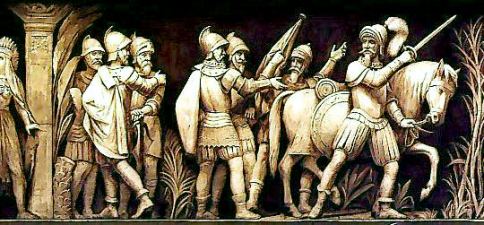

"Pizarro Going to Peru"
Scene from the frieze decorating the United States Capitol
Painted sometime between 1778 and 1780 by Constantino Brumidi
Once
the conquistadors Cortes and Pizarro had expanded the Spanish empire
Throughout the Americas, there was no denying the maritime superiority of European
powers. Because of their financial and technological power, European nations
like Spain and Portugal maintained a serious advantage over the rest of the
world. The way that the Spanish worked their way into the New World was through
a series of expeditions, led by a main investor. Usually a nobleman or simply
a wealthy man, he would be the primary financier of the expedition, along with
a series of smaller investors who helped with clothing, food, and weaponry.
Francisco Pizarro was the main investor for a series of expeditions into the
New World, and was dubbed the Captain of his ships. These expeditions maintained
a large military advantage over the native because of their steal weapons and
their horses. One of the most widely used military tactics t conquer the land
would be to capture the indigenous leader, which would create the need for ransom
and frighten the constituents.
With the creation and distribution of travel narratives, there is always the question of truthfulness involved in such works. This issue is of the utmost importance when discussing the topic of the Spanish Conquest. Why? Because while there are a plethora of accounts written by Spaniards, chronicling and glorifying their conquering of Latin America, there just a minute amount of texts remaining from the Incan and Aztec civilization that recount the same stories.
Within the wonderful world of 18th Century England, there is an immense amount of travel literature available, offering insight into the thoughts and ideas of the travelers. A few of the concepts that appear to repeat themselves time and time again, are issues like ethnocentricity, religion, and of course, the search for treasure.
The most direct connection between 18th Century Literature and and the Spanish conquest would be through a play entitled, "Pizarro, A Tragedy in Five Acts," originally written in German in 1799, and later adapted to the English stage the same year by Richard Brinsley Sheridan, an Irish-born playwright and one-time member of the English parliament.